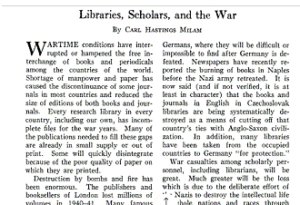
Libraries and Wars
In the 1950s, shortly after the Second World War, the Brazilian documentation magazine translated and published an article by Carl Hastings Milan on the Wars and the loss of documents and libraries.
documentation magazine translated and published an article by Carl Hastings Milan on the Wars and the loss of documents and libraries.
He had been director of the Birmingham Public Library, where he opened the first branch of services for African American authors and readers, the article is available online and shows a face of the war for libraries in reference to the previous post we made on this blog.
The transcriptions into Portuguese were made by Sylvio do Valle Amaral and the original article follows the war in September 1944, published in The Annals of The American Academy of Political and Social Science in Philadelphia.
The article begins by indicating the interruption and discontinuity of journals and publications during wartime, in addition to the material loss and lack of exchange of many documents.
The author emphasizes this loss where: “London publishers and booksellers lost millions of volumes in 1940-41. Several famous British scholarly libraries, and dozens of public ones, were damaged or destroyed. Several European countries, Russia, China, in addition to the Philippines, have suffered or are now experiencing a similar fate, but the saddest is yet to come” (MILAN, 1950, p. 50).
In advance many works were taken or hidden from German libraries, but the destruction and looting represent a cultural attack according to the “infamous” author who was credited to Hitler, it is important to look at this for history so that it does not repeat itself now.
Among the author’s denunciations is that also in the defeat: “Newspapers recently reported the burning of books in Naples, before the withdrawal of the Nazi army” (idem, p. 50), and thus a part of history is erased, regardless of of what those documents represent, they are an important cultural testimony of a time, which, because it is outdated, is subject to criticism, but there is no right to erase it, they are cultural documents.
It reestablishes the role of libraries, now also in crisis due to a distorted view of digital technology that we also post here, but the author says for that time: “Basic to the reestablishment of intellectual activity throughout the universe, is the reorganization of libraries” and ignoring this is a crime against the cultural preservation and memory of the people.
After emphasizing cooperation and support for libraries in Latin America and elsewhere, countries discuss the training of librarians:
“Despite the common recognition, in the United States and abroad, of the imperfections of our methods in preparing young men and women for library work, a surprisingly large number of students from abroad come to this country at normal times to obtain what schools of this specialty can offer” (MILAN, 1950, p. 53)
Milan, C. H. As bibliotecas, os intelectuais e a Guerra, trad. Sylvio do Valle Amaral. Rio de Janeiro: REVISTA DO SERVIÇO PUBLICO, AGOSTO DE 1950 (original in 1944).









